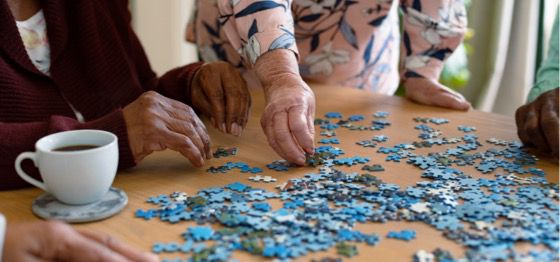The term “dementia” is used to describe a group of conditions that cause a person to lose the ability to think, along with their memory, reasoning and decision-making skills. Dementia isn’t a specific disease. There are many different types, and it usually develops after age 65.1 In fact, about one-third of all seniors aged 85 and older may have some form of dementia. However, dementia is not a normal part of aging. Many older adults may live into their 90s without being affected.2 According to the Centers for Disease Control and Prevention (CDC), approximately 14 million people in the United States will be diagnosed with some form of dementia by the year 2060.3
Dementia defined
To define dementia, it may be helpful to recognize that it isn’t simply “senility” or “going senile.” These catch-all terms reflect an outdated way of thinking about mental decline and growing older.4 Dementia is actually a group of disorders caused by abnormal changes in the brain that can trigger the decrease of cognitive abilities—thinking, reasoning, remembering, etc.—and be disruptive enough to impair an older adult’s daily life and independence.5 The stages of dementia range from mild, when it’s just beginning to affect the person, to severe, when that person has to completely depend on others for help with simple daily activities.6
The most common types of dementia
- Alzheimer’s disease.7 Caused by specific changes in the brain, this is the most common cause of dementia, accounting for 60 to 80% of cases. Seniors with Alzheimer’s have trouble remembering recent events. Difficulty remembering things in the more distant past happens later in the disease, along with problems related to walking, talking and personality changes. The most important risk factor for Alzheimer’s is family history. Older adults who have a first-degree relative with Alzheimer’s have a 10 to 30% higher risk of developing the disease.
- Vascular dementia.8 A tenth of all dementia cases are linked to strokes or other problems with blood flow to the brain. Risk factors include diabetes, high blood pressure and high cholesterol. Symptoms can vary depending on the size and area of the brain affected. Vascular dementia progresses in a “stair-step” fashion, in that symptoms can suddenly get worse as the older adult experiences additional strokes or mini-strokes.
- Dementia with Lewy bodies.9 Named for Frederich Lewy, M.D., who worked with Dr. Alois Alzheimer in the early 1900s, this type of dementia is thought to be caused by certain protein structures in the brain that lead to declines in thinking, reasoning and independent functioning. Symptoms include changes in alertness, visual hallucinations, rapid eye movement (REM) sleep disorder, trembling or stiffness.
- Frontotemporal dementia.10 Also known as frontotemporal degeneration, this type of dementia includes a group of disorders caused by nerve cell loss in the frontal or temporal lobes of the brain. The nerve cell damage in these areas can lead to behavioral and personality changes, as well as difficulty speaking or comprehending others.
- Mixed dementia.11 More than 1 type of dementia can be present in the brain at the same time, especially in seniors aged 80 and older. For example, an older adult may have Alzheimer’s disease together with vascular dementia. But, since the symptoms of 1 type may overlap with the symptoms of another, it’s not always obvious that someone is experiencing mixed dementia.
Symptoms of dementia in older adults12
- Memory loss that disrupts daily life
Among the earliest, most common symptoms of dementia is forgetting recently learned information. Older adults with dementia may also forget important dates or events, ask the same questions over and over, or start relying on memory aids and/or family members for things they used to handle by themselves.
- Difficulty completing familiar tasks
Seniors with dementia may have trouble driving to a place they’ve always been familiar with, compiling a grocery list or recalling the rules of a favorite card or board game.
- Confusion with time or place
Older adults with dementia may lose track of dates, seasons and the passage of time and may have trouble understanding something if it is not happening immediately. They may even forget where they are or how they got there.
- Trouble understanding visual images and spatial relationships
Vision problems may also be a sign of dementia. This may lead to balance difficulties, trouble reading or problems judging distance, which can negatively affect driving.
- Problems with words in speaking or writing
Seniors with dementia may stop in the middle of a conversation and have no idea how to continue, or they may repeat themselves. They may also have trouble naming a familiar object or use the wrong word to describe it.
- Withdrawal from work or social activities
Due to the inability to hold or follow conversations, older adults with dementia may withdraw from their jobs, their hobbies or other social activities.
- Changes in mood or personality
Seniors living with dementia often become confused, suspicious, depressed, fearful or anxious. They may become easily upset with family or friends.
What causes dementia in seniors?
Dementia occurs when changes in certain brain regions cause nerve cells and connections to stop working properly. These changes may have a genetic basis, happening in some people but not others. Researchers are continually working to determine the causes of dementia.13
Are there treatments for dementia in older adults?
Though most types of dementia can't be cured yet, there are ways that doctors can help seniors manage the disease. Medications that temporarily improve the symptoms of dementia include cholinesterase inhibitors, memantine and other drugs used to treat depression, sleep disorders and hallucinations.14 Non-drug treatments like occupational therapy, environmental modification, and simplifying of tasks may also be valuable in lessening the symptoms of dementia in older adults.15
How can seniors prevent the risk of dementia?16
While there are currently no proven ways to prevent Alzheimer’s and related dementias, there may be steps older adults can take to help reduce their risk:
- Control high blood pressure
- Manage blood sugar
- Maintain a healthy weight
- Eat a healthy diet
- Keep physically and mentally active
- Stay connected with family and friends
- Sleep well
While research continues on the causes of dementia, older adults and their loved ones may benefit from being educated on the symptoms and steps to prevent the condition.
Go365 by Humana® makes wellness fun and easy. We help Humana Medicare members with Go365® on their plan reach health goals, as well as take care of their physical and emotional health—allowing members to thrive at any age.
Humana Medicare members with Go365 on their plan can enroll in Go365 at
Go365 is a well-being and rewards program for many Humana Medicare Advantage members. Rewards have no cash value and can only be redeemed in the Go365 Mall. Rewards must be earned and redeemed within the same plan year. Any rewards not redeemed by December 31st will be forfeited.
If you need to enroll in Medicare Advantage or change your plan outside of the usual Medicare Annual Election Period, a Special Election Period (SEP) could be the answer. For information on eligibility, visit Humana’s
To learn more about Humana Medicare Advantage, call to speak with a licensed Humana sales agent at 1-844-321-5843 (TTY:711), Monday – Friday, 8 a.m. – 8 p.m. local time or visit
Sources:
1Aubrey Bailey, “Dementia Facts and Statistics: What You Need to Know,” Verywell Health, last accessed April 4, 2023,
2“What is Dementia? Symptoms, Types and Diagnosis,” National Institute on Aging, last accessed April 4, 2023,
3“About Dementia,” Centers for Disease Control and Prevention, last accessed April 4, 2023,
4“What is Dementia?,” Alzheimer’s Association, last accessed April 4, 2023,
5“What is Dementia?”
6“What is Dementia? Symptoms, Types and Diagnosis.”
7“About Dementia.”
8“About Dementia.”
9“Dementia with Lewy Bodies,” Alzheimer’s Association, last accessed April 4, 2023,
10“Frontotemporal Dementia,” Alzheimer’s Association, last accessed April 4, 2023,
11“About Dementia.”
12“10 Early Signs and Symptoms of Alzheimer’s,” Alzheimer’s Association, last accessed April 4, 2023,
13“What is Dementia? Symptoms, Types and Diagnosis.”
14“Dementia,” Mayo Clinic, last accessed April 4, 2023,
15“Dementia.”
16"Can I Prevent Dementia?,” Alzheimers.gov, last accessed April 4, 2023,
Consult your doctor before beginning any new diet or exercise regimen.
This information is provided for educational purposes only. It is not to be used for medical advice, diagnosis or treatment. Consult your healthcare provider if you have questions or concerns.
Humana is a Medicare Advantage HMO, PPO and PFFS organization with a Medicare contract. Humana is also a Coordinated Care plan with a Medicare contract and a contract with the state Medicaid program. Enrollment in any Humana plan depends on contract renewal.






